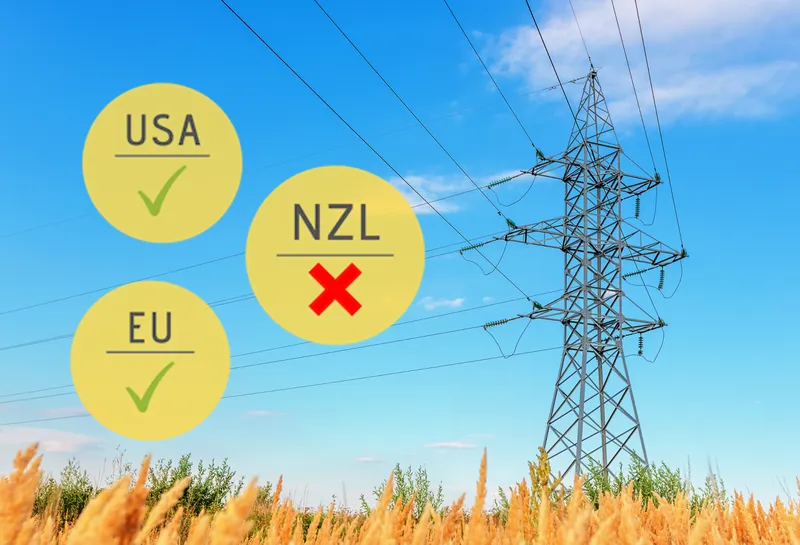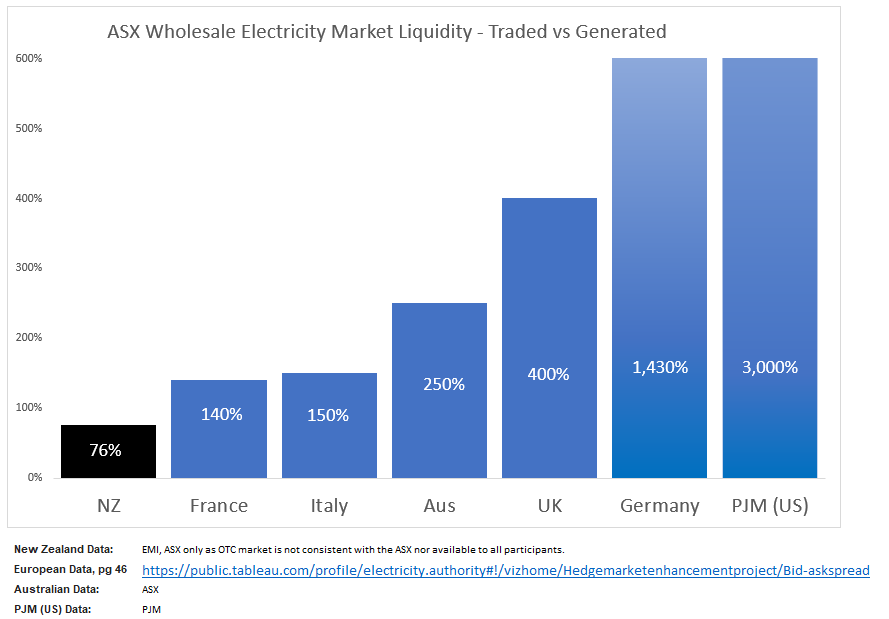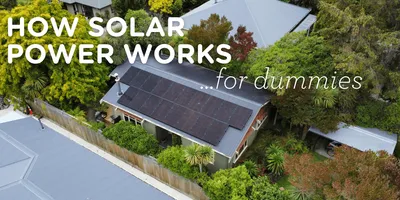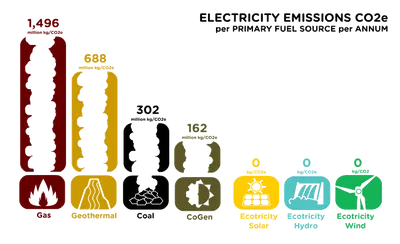NZ Power Companies Non Compliant under EU and US Laws
11/02/2019

NZ Electricity market rules are 19 years behind EU and the US.
Updated 28/11/2019
Remember the bad old days when Telecom was able to charge like a wounded bull?
Telecom was a vertically integrated wholesaler and retailer, and was actively stifling competition.
In 2007 Telecom (yes, 12 years ago) was forced to split into Chorus (wholesale) and Telecom (retail, now Spark).
Our telco costs have since plummeted 20% – 47% below the OECD average.
Breaking up vertically integrated operators works. It increases competition, and lowers costs to the consumer.

NZ Electricity Market is Highly Vertically Integrated
= Higher Prices.
Sadly, the same cannot be said about New Zealands electricity market. In the draft Electricity Price Review(EPR1) commissioned by the current government, they agree. The current electricity wholesale market is broken. Further, the EPR1 recommended we move to mandatory market making.
We have one of the highest vertically integrated electricity markets in the world. And that’s not healthy for consumers.
And little has changed in 14 years.
In 2005, 88% of electricity generation effectively went to generator owned retail operations.
In July 2019 it is 84%, a meagre 4% improvement.

The large gentailers are effectively bypassing and regularly undercutting wholesale markets. This has resulted in the death of 7 independent electricity retailers Since October 2018.
It also means there has been less investment in cheaper renewables like wind.
NZ Power Companies Non Compliant under EU and US Rules.
In 1998 (yes, 21 years ago), and after the failure of independent European electricity retailers (which happened in NZ in October 2018) the EU banned the sale of electricity generation to vertically owned retailers without first making the same offer to the wholesale electricity market.
A similar scenario emerged in the US in 2000 when Enron started rigging the market by shutting down plant and pushing wholesale prices up by 800%. This is no longer possible in the US. As an example in the PJM (Eastern US) electricity market, generators and retailers (i.e. Load Serving Entities) must transact through wholesale markets.
The EU and US rules, if applied to any of the large gentailers in New Zealand, would mean they would be deemed to be non compliant.
Not surprisingly, New Zealand therefore has an un-competitive forward wholesale electricity market with comparatively low liquidity (76%) on the forward ASX market when compared to Australia, Italy, France, Germany, the UK, and the US PJM market. Over The Counter (OTC) contracts are not included in these figures as we have seen substantial evidence that gentailers rates receive substantially lower rates and security requirements on average than Independent Retailers.

What are the ramifications?
It has real and negative ramifications for New Zealand.
The electricity industry in New Zealand has a revenue of NZ$10 billion, double the telco market, so electricity has a substantial financial impact on everything kiwis and kiwi businesses do.
The results of a vertically integrated (#Rigged) electricity market are substantial.
- Energy Poverty– Energy poverty, affects over 100,000 of Kiwi households according to the Electricity Price Review. People are getting sick from not being able to heat their homes in winter.
- Lower Renewable Investment– because there is long term uncertainty in the market, there has been low levels of investment in cheaper renewables such as wind and solar.
- Inflation– Electricity has a significant effect on inflation, which in turn makes our companies less competitive overseas.
- Foreign drain– partial overseas ownership of some of the larger electricity companies means Kiwis hard earned cash is going offshore. A recent report noted that electricity companies have overcharged $4.3 billion between 2010 and 2016.
The solution. What needs to happen?
Don’t believe a word the big power companies put out there to say the existing market is competitive.
It’s not.
This manifested itself with 7 independent electricity retailers being pushed out of the market since October 2018, while large power company profits continue to rise.
The electricity wholesale market is but one issue to be fixed within the electricity industry.
Other areas needing attention includes lowering local lines charges, possibly through consolidating local lines companies. Another major issue is win backs where losing retailers only offer better prices to their customers when they are about to lose them, stifling competition.
There are however some very simple changes that can be made to the existing electricity wholesale market in short order.
- Mandatory Wholesale Market Making
Separating generators and retailers is one solution, similar to Telecoms split up. And this has been done in other markets.
It can however be messy and takes time.
A simpler way to achieve the same result is require generators and retailers to trade 150% or more of their annual volumes through forward hedge markets. That way retail operators are effectively unable to hedge with their own generation without going through the wholesale market, and retail prices will be based on a competitive, not inflated wholesale market.
- Increase the term of the market from 3 years to 10 years
Under the current forward ASX wholesale market term, 3 years is the maximum term a hedge contract can be entered into. The ASX forward market could be changed to 8 or 10 years very easily. 3 years is simply too short to allow for the following reasons, both on the generation and retail side;
- It’s too short a period to support cheaper and cleaner renewable investment which need upwards of 8 years to support their investment. At a period of only 3 years, the forward ASX market is primarily supporting short run thermal generation including gas and coal. Other countries that have longer term hedge and auction markets are seeing more investment into wind and solar plant which in turn is bringing down wholesale costs.
- It’s too short to provide a long term view for retailers to build long term and competitive retail businesses.
- A secondary reserves market may also be required, which is essentially a backstop market for holding a fixed quantity of fuel (for instance, hydro or thermal capacity) which is held back and brought on only as required in emergency situations.
What can you do to make a change? Talk to your local MP. Embrace Solar.
The first step to set the electricity industry on the right path is to talk to your local MP, feel free to share this article with them. It’s time for action.
Secondly, there is a way around all these electricity market shenanigans. It’s solar.
By going solar you short circuit the electricity market and give more power back to you, the consumer.
More and more Ecotricity customers have embraced solar and have substantially lowered their grid based consumption and in the vast majority of cases they’re saving money as well.
Written by:
Al Yates, Director Ecotricity







